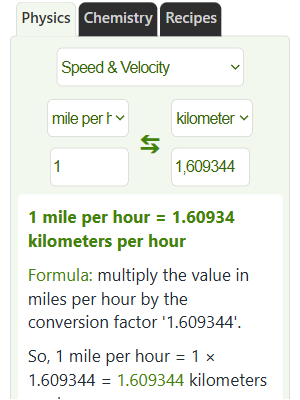How many knots in 110 mph?
110 mph equals 95.5874 knots
Mph To Knot Converter
| ⇆ | ||
|
|
||
|
🔗 Help our site grow by sharing it!
|
||
To calculate a mile per hour value to the corresponding value in knot, just multiply the quantity in mph by 0.86897624190065 (the conversion factor).
Here is the formula:
Value in knots = value in mph × 0.86897624190065
Suppose you want to convert 110 mph into knots. Using the conversion formula above, you will get:
Value in knot = 110 × 0.86897624190065 = 95.5874 knots
Comprehensive guide to speed unit conversion: miles per hour to knots and more
Understanding how to convert speed measurements like miles per hour to knots, and vice versa, is important to achieve exactness in your calculations.
How to convert mph to knots (kn)
To convert from mph to knots:
- Use the conversion factor: 1 mph equals 0.868976 knots.
- For example, to convert 110 mph to kn, calculate
110 x 0.868976kn, which is95.5874kn. - The formula is: speed in kn = speed in mph x 0.868976
How to convert kn to mph
For converting knots to miles per hour:
- Remember, 1 knot is approximately 1.15078 miles per hour.
- To convert 95.5874kn to mph, multiply
95.5874 x 1.15078, resulting in110 mph. - The conversion formula is:
speed in mph = speed in kn x 1.15078
These formulas provide a reliable method for speed unit conversions across different systems.
This converter can help you to get answers to questions like:
- How many mph are in 110 knots?
- 110 mph are equal to how many knots?
- How much are 110 mph in knots?
- How to convert mph to knots?
- What is the conversion factor to convert from mph to knots?
- How to transform mph in knots?
- What is the formula to convert from mph to knots? Among others.
| Mph | = | Knots |
|---|---|---|
| 20 mph | = | 17.38 knots |
| 30 mph | = | 26.07 knots |
| 40 mph | = | 34.76 knots |
| 50 mph | = | 43.45 knots |
| 60 mph | = | 52.14 knots |
| Conversions 5 completed | ||
| 70 mph | = | 60.83 knots |
| 80 mph | = | 69.52 knots |
| 90 mph | = | 78.21 knots |
| 100 mph | = | 86.90 knots |
| 110 mph | = | 95.59 knots |
| Conversions 10 completed | ||
| 120 mph | = | 104.28 knots |
| 130 mph | = | 112.97 knots |
| 140 mph | = | 121.66 knots |
| 150 mph | = | 130.35 knots |
| 160 mph | = | 139.04 knots |
| Conversions 15 completed | ||
| 170 mph | = | 147.73 knots |
| 180 mph | = | 156.42 knots |
| 190 mph | = | 165.11 knots |
| 200 mph | = | 173.80 knots |
| 210 mph | = | 182.49 knots |
Note: values are rounded to 2 decimal places for clarity.
Knots: A Unit of Measurement for Speed
A knot is a unit of speed equal to one nautical mile per hour (approximately 1.852 kilometers per hour or 1.15078 miles per hour). knots are frequently used in navigation and aviation.
The formal definition of a knot is the speed at which one nautical mile is traveled in one hour.
Conversions to Other Units of Measurement:
- Kilometers per Hour (km/h): To convert knots to kilometers per hour, multiply the speed in knots by approximately 1.852. For example, 1 knot is equal to approximately 1.852 kilometers per hour.
- Miles per Hour (mph): To convert knots to miles per hour, multiply the speed in knots by approximately 1.15078. For example, 1 knot is equal to approximately 1.15078 miles per hour.
- Meters per Second (m/s): To convert knots to meters per second, multiply the speed in knots by approximately 0.514444. For example, 1 knot is equal to approximately 0.514444 meters per second.
- Feet per Second (ft/s): To convert knots to feet per second, multiply the speed in knots by approximately 1.68781. For example, 1 knot is equal to approximately 1.68781 feet per second.
- Beaufort Scale: The Beaufort scale is a measure of wind force based on observed sea conditions. It ranges from 0 (calm) to 12 (hurricane force). Knots are often used in conjunction with the Beaufort scale to estimate wind speeds.



